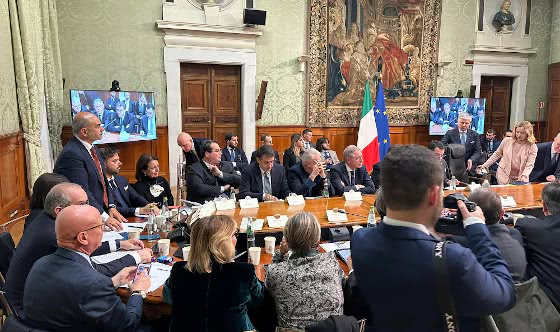
On Friday, a delegation of the Italian Confederation Shipowners was received by the President of the Council of Ministers, Giorgia Meloni, accompanied among others by the ministers Fitto, Giorgetti, Salvini, Urso and Zangrillo. During the meeting, which focused on the budget budget 2024, the director general of the Confitarma, Luca Sisto, pointed out that " the most beautiful news, for which-he specified-we thank in particular the Minister of Economy and Development. Finance Giorgetti and the Deputy Minister Leo, together with the Ministers of Labor and Transport, is the confirmation, as required by Confitarma, of the appropriations related to the Italian International Register and the tonnage tax system, the two pillars-said Sisto-that allow the maintenance of the national flag fleet and the competitiveness of our shipowner industry. Industry has always been, and I am particularly appealing to Minister Urso, a symbol and carrier of Made in Italy in global markets. "
Recalling then that Confitarma has always been supporting the positivity of a measure like the Marebonus that favours the intermode road-sea with obvious benefits for the community, especially in environmental terms, Sisto explained that the Confederation has "welcomed, therefore, with favour the publication on the" Official Gazette "of the new incentive on the maritime intermodality" Sea Modal Shift ", but unfortunately-the Budget Law contains a cut to the already reduced resources that have been allocated to a tool that has proved to be ten times more efficient than the 110% Superbonus. It is necessary, "Sisto said," that this government points out this incentive, adding funding, to promote a tool like the Autostrade of the Sea that represent the most green mode of movement of goods and people. "
Addressing the Minister of Infrastructure and Transport Salvini, Sisto highlighted how the EU's ETS, with the inclusion of sea transport in the system of the European Union's emission trading scheme, goes to the transport of transport. maritime with a tax that will have the effect of the back modal shift, with goods returning to the road, despite shipping, which moves 90% percent of the world's goods by emitting less than 3% percent of the total greenhouse gases, is the most sustainable mode of transport per unit of transported merchandise.
"As for the supplementary fund, I would like to return to the theme of the" decree fleets "(the only direct intervention planned by the PNRR), which we believe is important to accompany the sector towards the green transition of the entire fleet," the IMF said. mercantile. 90% of the sums allocated have not been committed, not because of the lack of interest of arming towards such an incentive system, but rather, due to certain constraints intended for access which, as several times we have reported, have excluded an important share of the fleet operated by the national armaments. Among the major critiques, the expectation of a five-year geographical constraint linked to the use of the incentive object and the obligation to make green interventions, even those of refitting, is likely to be counted. at European shipyards. This is why we ask Minister Fitto not to disperse the resources allocated to the renewal of the fleet and to maintain them for the green transition of the sector. " 
